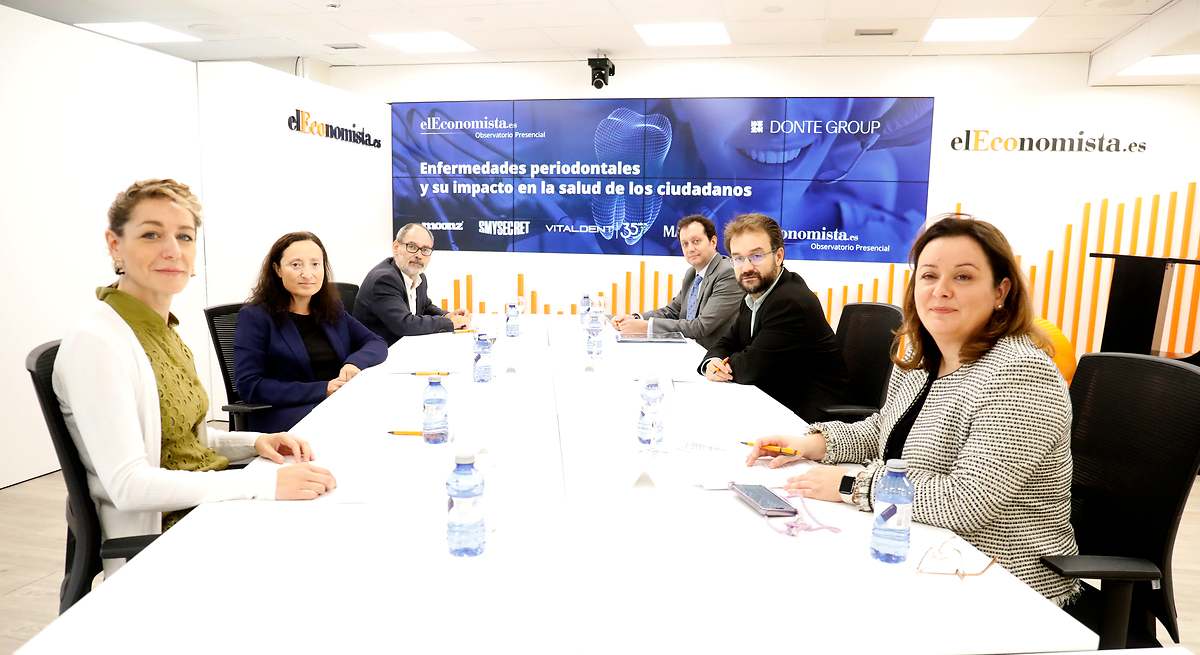
The World Health Organization (WHO) categorizes oral diseases as one of the most prevalent types. Within these, periodontal diseases – which affect the gums – are among the most common. These constitute a fundamental burden on health systems like that of Spain. The objective is to reduce cases by 10%, although professionals say that it will be a challenge during the Observatory “Periodontal diseases and their impact on the global health of citizens”, organized by DONTE GROUP and elEconomista.es.
Oral pathologies are related to the main chronic non-communicable diseases (e.g. cardiovascular pathologies, diabetes, etc.). The big star of medical periodontics is the link between periodontitis and diabetes. “Patients with diabetes have three times the risk of having periodontitis and those who have diabetes and periodontitis have more difficulties in having adequate glycemic control,” explains the associate professor at the Complutense University of Madrid (UCM) and secretary of the Working Group. between the Spanish Society of Periodontics (SEPA) and the Spanish Diabetes Society (SED), Dr. Eduardo Montero.
In addition, it is related to cardiovascular conditions, among others. “We must be aware that oral health is part of people’s general health,” says the medical director of DONTE GROUP, Dr. Clara Esteban. Also “having good oral health is important to maintain healthy mental health,” says the secretary of the Spanish Society of Epidemiology and Oral Public Health (SESPO), Dr. Elena Martínez.
Periodontal diseases consume a large percentage of healthcare spending. What’s more, not the entire population has access to these services due to their cost. “In 2022 we estimate four million people who did not have access for economic reasons,” says Clara Esteban. Nowadays, only certain groups (children, young people, pregnant women and people with mental or physical disabilities) can access public oral services. “The rest is borne privately. Families spend around 3,500 euros a year,” says the professor of Political Economy at the University of Malaga, Alberto Montero. The Government has communicated a contribution of 44 million, and two others of 68 million each.
DONTE GROUP commissioned a professor from the University of Malaga to write a report in 2020 to analyze the costs of universalizing the oral portfolio. If it were carried out successfully, the public sector would have to disburse 5,000 million euros. “It not only assumes the disease itself, but also the increase in demand from people who could not access it for economic reasons, he explains.
The key is prevention
Prevention is essential because it invests in general health. The first measure “should be communication and dissemination of oral health among the medical community, especially doctors in outpatient clinics,” says Eduardo Montero. In addition, the periodontics coordinator of DONTE GROUP, Dr. María Latorre, explains that healthy lifestyle habits should be included from the moment is a child. “In childhood it is easier than in other stages of life to shape habits,” adds Elena Martínez. An example is brushing your teeth properly. Likewise, prevention must be both at a health level and in other areas such as health. educational or nutritional. In other words, promote health as a whole.
Regarding periodontal diseases, a control of the risk factors. The professor at the Complutense University of Madrid says that dental plaque is the main thing and “it can be solved by brushing your teeth properly and with oral cleaning in many cases.” “From a preventive point of view we can reduce healthcare spending,” says the Periodontics coordinator at DONTE GROUP.

Clara Esteban: “In our country, 98% of spending in the field of oral health is private”
Many studies show that the oral health of Spaniards has improved in the last 20 years. However, there is still a way to go and there is a very important challenge: raising awareness among the population and the political class. Clara Esteban points out that in Spain 98% of oral health spending is covered by the private sector. “There is an economically disadvantaged population, which in 2022 will number four million, who do not have access to oral health services for economic reasons,” he says.
Professionals ask to include the public-private collaboration in these services so that the entire population can access them. There has already been progress in this matter. “A contribution of 44 million and two of 68 million each has been put on the table. It is close to what we said is necessary to treat the disadvantaged population,” he indicates. These amounts have subsequently been distributed among the autonomies. Esteban says that it is necessary to implement the WHO Oral Strategy 2030, which advocates integrating dental health into Primary Care.
Spain starts with a series of advantages. “We have a large number of dentists and facilities in both public and private healthcare to provide coverage to the entire population. We are also leaders in Europe in treatment and diagnosis,” he points out. “With financing on the table, we have to start working and put dentistry as part of medicine,” he adds.
On the other hand, the prevention is key in oral health and it is necessary to send this message to the population, especially the little ones. A fundamental point in this matter is the consumption of sugar.
María Latorre: “Doctors must be re-educated so that they stop seeing the mouth as an entity separate from medicine”
Since the 80s, dentistry It is a university degree separate from medicine. However, according to Dr. María Latorre, “we dentists have internalized when and what we have to refer to other specialties, but we miss that this also comes from Primary Care doctors and other areas.” Therefore, he states that “the rest of the doctors must be re-educated so that they stop seeing the mouth as an entity separate from medicine.” Greater visibility of dentistry is also necessary in faculties.
In terms of periodontal diseases, these consume a huge part of healthcare expenses. “We have the means and facilities, but we must provide them with adequate personnel and resources,” he points out. Regarding budgets, however, it remains to “establish a plan that can be carried out, bring it down to earth, and apply the therapeutic processes, and prior to them the preventive ones,” he adds.
Elena Martínez: “These pathologies are among the most prevalent and create a burden on global healthcare”
Elena Martínez points out that this type of pathology is one of the most prevalent and They constitute a fundamental burden in global healthcarel. Today, the Government does not cover all coverage, but it is making progress in this matter. In addition, professionals seek to emphasize the need to invest in prevention and promotion in both the health and educational fields. Also at the nutrition level. “It is cheaper to prevent than to cure,” he says. It is worth mentioning that there is a relationship between oral health and other diseases. “You have to establish healthy lifestyle habits from the beginning and even emphasize it in pregnant women who are the people who are going to educate the little ones,” he says.
One of the measures included by the WHO is the strengthening oral health units. “There are regions that lacked or had few oral hygienists who are the ones who promote healthy living habits,” he indicates.
Alberto Montero: “10% of the population does not access oral health services for economic reasons”
Almost 79,000 million is the cost of oral health in Europe. According to the professor of Political Economy at the University of Malaga, Alberto Montero, all people will have some pathology of a dental nature throughout their lives. However, not everyone can access oral health services. “The latest European survey says that 10% of the population could not access oral health services for economic reasons,” he indicates.
Furthermore, it highlights that the vast majority of services are paid for privately to the point that “families spend around 3,500 euros a year.” Universalizing the oral health portfolio in Spain would require an investment by the Government of around 5,000 million euros. “Our country cannot afford to be behind European countries in oral matters,” he emphasizes.
Eduardo Montero: “Patients with diabetes have three times the risk of suffering from periodontitis”
In the last 25 years there have been advances in research into the relationship between periodontitis and other diseases. However, the protagonist is the link between this pathology and diabetes. “The relationship is bidirectional. Patients with diabetes have three times the risk of having periodontitis and at the same time diabetics with periodontitis have more difficulties in having adequate glycemic control,” explains Eduardo Montero. In addition, it points out that people who do not have diabetes and do have periodontitis have a five-fold higher risk of developing diabetes in six and eight years. As for other pathologies, the inflammation associated with periodontitis causes cardiovascular conditions, among others.
According to Professor Montero, the first measure to prevent periodontal diseases should be the communication and dissemination of oral health with the help of the medical community. “Doctors in outpatient clinics must be aware of these diseases,” he says.
